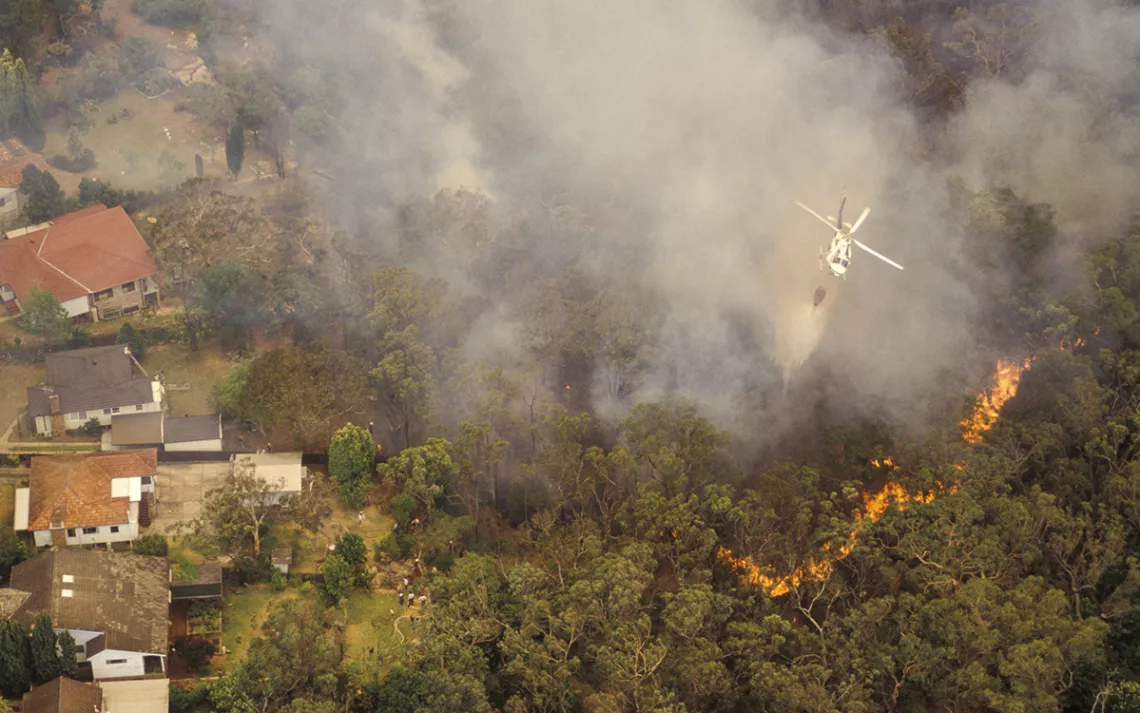California in Flames, Again
Climate change makes a flammable state even more so

Photo by IStock | John Carnemolla
On Sunday night, as midnight approached, the flatlands of San Francisco started to smell like an enormous bonfire. My neighbors and I speculated as to the cause. Who could possibly have a backyard big enough to make so much smoke? Was a building nearby on fire? By Monday, we all knew the answer: The hills of Sonoma, Napa, and Santa Rosa, north of the city, were in flames.
By Tuesday morning, San Francisco and Oakland smelled like the inside of a smokers' lounge, and the haze looked like Los Angeles at the height of the smog era. The wind was blowing from east to west as fast as 60 mph, carrying hot, dry air instead of the moist, heavy air over the ocean. Social media, normally heavy with political outrage and cat memes, was now full of people to the north declaring themselves safe (“Have been serving up pie and kindness at work all day under a sky of smoke and ash,” wrote one) and people in San Francisco and Oakland offering up sofas and spare bedrooms.
In news reports, the land on fire has often been referred to as “Wine Country”—maybe because the only parts of Sonoma and Napa that some out-of-towners visit are the parts that have wineries—but the area has always been more complex than that. “You might think Wine Country = rich, and it is,” wrote Jessica Ellis, a filmmaker from Santa Rosa, on Twitter, “but when I grew up, it was largely middle-class families, now pushed to the brink by costs. So this is not just people's homes and jobs burning. This may be a turning point in the city's makeup. No one except the rich can recover.”
It’s been a long summer of fires. In July when I traveled up to Northern California, the sky was white with smoke from the Island Fire, and when I traveled to Montana in August, there were wildfires burning there, too. In September, fires burning in the Pacific Northwest kept some friends waiting with bags packed in case evacuation orders came, and friends in Seattle and Portland had days of gray skies and orders not to exercise. We shouldn't be surprised about anything burning anymore, especially with the National Climate Assessment predicting that by 2080, wildfires will consume four times as much of the Northwest each year than what has burned over the last decade.
Also this year, California emerged from the longest drought on record, only to experience epic mudslides when the rain returned to land that was no longer stabilized by plant life and had already been destroyed by drought and wildfire. The changing climate that had boosted the drought also amped up the rainfall, so we can expect this to be a part of the new normal as well. It makes me think of reading the first line of the Whole Earth Catalog years ago as a kid, sitting in the basement of my childhood home, where all familial artifacts migrated eventually: “We are as gods and might as well get good at it.” That catalog was probably destroyed in the 2014 Michigan rainstorms that flooded my parent’s basement, another sign that climate change is coming to reclaim the wetlands on which their subdivision was built.
By late yesterday, reports began to come in that at least some of the fires might have been started by power lines and electrical transformers that began shooting sparks, and, in a few cases, exploded the night that the fires began. A spokesperson for PG&E blamed “the historic wind event”—the kind of thing that no one could prepare for. A lawyer representing several families that had already mobilized to sue the utility described it as exactly the kind of thing that a utility could prepare for, and argued that PG&E had failed to take measures that every Californian in fire country has learned the hard way: If you don’t want something to catch on fire, keep the plants and trees around it under control, especially after a rainy winter has sent plants into overdrive and a hot summer has reduced them to tinder.
It’s been a long season of disasters. Three major hurricanes: Harvey, Irma, Maria. Record-setting heatwaves. Even as the current administration maneuvered to remove climate change from the country’s rebuilding efforts, it’s more clear than ever that we need to plan for a different future. We went and altered the planet’s climate, which is the kind of maneuver that was previously only ascribed to gods and volcanoes. The next step is planning our way out of it.
 The Magazine of The Sierra Club
The Magazine of The Sierra Club



